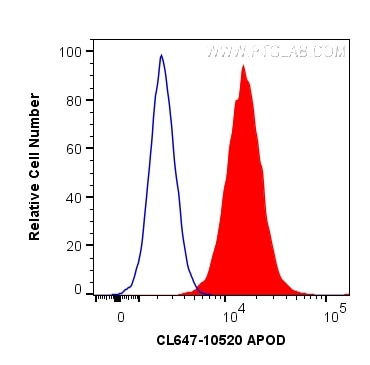Validation Data Gallery
Tested Applications
| Positive FC (Intra) detected in | HeLa cells |
Recommended dilution
| Application | Dilution |
|---|---|
| Flow Cytometry (FC) (INTRA) | FC (INTRA) : 0.20 ug per 10^6 cells in a 100 µl suspension |
| It is recommended that this reagent should be titrated in each testing system to obtain optimal results. | |
| Sample-dependent, Check data in validation data gallery. | |
Product Information
CL647-10520 targets APOD in FC (Intra) applications and shows reactivity with human samples.
| Tested Reactivity | human |
| Host / Isotype | Rabbit / IgG |
| Class | Polyclonal |
| Type | Antibody |
| Immunogen | APOD fusion protein Ag0812 相同性解析による交差性が予測される生物種 |
| Full Name | apolipoprotein D |
| Calculated molecular weight | 33 kDa |
| Observed molecular weight | 22-33 kDa |
| GenBank accession number | BC007402 |
| Gene Symbol | APOD |
| Gene ID (NCBI) | 347 |
| RRID | AB_2934822 |
| Conjugate | CoraLite® Plus 647 Fluorescent Dye |
| Excitation/Emission maxima wavelengths | 654 nm / 674 nm |
| Form | Liquid |
| Purification Method | Antigen affinity purification |
| UNIPROT ID | P05090 |
| Storage Buffer | PBS with 50% glycerol, 0.05% Proclin300, 0.5% BSA , pH 7.3 |
| Storage Conditions | Store at -20°C. Avoid exposure to light. Stable for one year after shipment. Aliquoting is unnecessary for -20oC storage. |
Background Information
Apolipoprotein D (ApoD) is a member of the lipocalin superfamily of ligand transporters, and has been implicated in the transport of small hydrophobic molecules. ApoD is also a component of plasma high-density lipoproteins (HDL). Alteration of ApoD expression has been linked to multiple neurological disorders, including Alzheimer's disease.
Protocols
| Product Specific Protocols | |
|---|---|
| FC protocol for CL Plus 647 APOD antibody CL647-10520 | Download protocol |
| Standard Protocols | |
|---|---|
| Click here to view our Standard Protocols |
